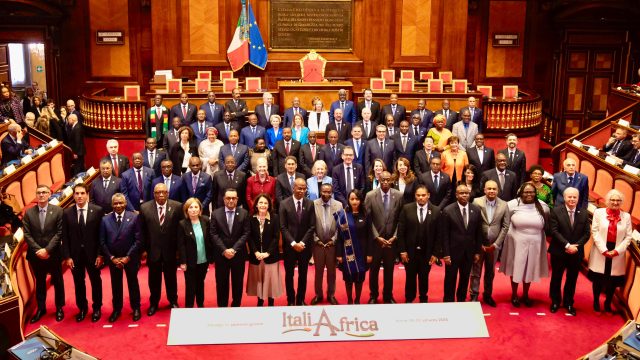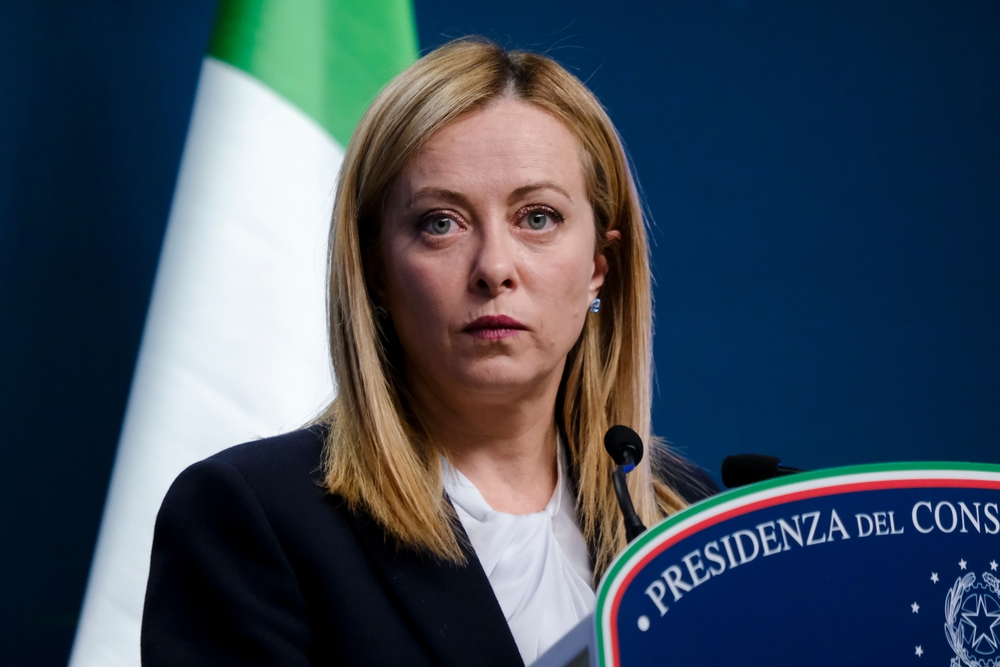
Rome, renowned for its rich history and cultural heritage, stood as a symbol of unity as it welcomed leaders from Italy and across Africa for the momentous “Italy-Africa Summit: A Bridge to Common Growth.” Spearheaded by Italian Prime Minister Giorgia Meloni, this landmark event signified a renewed commitment to fostering collaboration and dialogue between Italy and the African continent.
In her opening address, Prime Minister Meloni emphasized the significance of the summit, stating, “This gathering reflects a deliberate political choice to prioritize Africa on the G7 agenda during our presidency. It underscores the interconnectedness of Europe and Africa and our shared aspirations for a brighter future.”
The summit convened an illustrious gathering of dignitaries, including heads of state and government from African nations, representatives from the European Union with the President of the European Commission, Ursula von der Leyen, the President of the European Parliament Roberta Metsola, the President of the European Council, Charles Michel; the President from the African Union, Azali Assoumani; the president of the Commission of the African Union, Moussa Faki Mahamat; the deputy Secretary General of the United Nations, Amina Jane Mohammed; and many delegates from prominent international organizations. This diverse assembly reflected the collective resolve to address common challenges and pursue shared opportunities.
At the heart of the summit was the unveiling of a very ambitious Plan that takes the name of “Enrico Mattei”, an Italian politician and businessman who founded the very well-known Petrol Company ENI.
The announced Plan is a comprehensive €5.5 billion investment plan, aimed at catalyzing sustainable development initiatives across Africa. Prime Minister Meloni articulated the objectives of this ambitious plan, stating, “Our investment plan is a testament to our commitment to Africa’s development journey. It encompasses strategic interventions in key sectors such as education, agriculture, health, energy, and water resource management.”
The education sector will receive substantial support to enhance teacher training programs, revitalize curricula, and expand vocational training opportunities aligned with market demands. In agriculture, initiatives will focus on improving food security, promoting agro-industrial development, and advancing non-fossil biofuel production.
Healthcare interventions aim to strengthen primary maternal and child health services, bolster local healthcare capacity, and enhance disease prevention and management strategies. The energy sector will see efforts to position Italy as a key energy hub, facilitating sustainable energy access and fostering cross-continental energy partnerships.
Moreover, water resource management initiatives will prioritize the drilling of solar-powered wells, rehabilitation of existing water sources, and investments in water distribution infrastructure to ensure equitable access to clean water.
Prime Minister Meloni underscored the imperative of addressing the underlying drivers of migration through sustainable development efforts, stating, “Our goal is to create conditions where individuals are not compelled to migrate in search of a better life but can thrive in their own communities.”
As the summit concluded, participants expressed optimism about the prospects of deeper collaboration between Italy and Africa. The event served as a testament to the shared commitment to building a more prosperous, inclusive, and interconnected future for both regions.
 Prime Minister Giorgia Meloni’s narrative surrounding the summit has successfully captured international attention, reflecting an alignment of interests between Italy and Indo-Pacific nations. However, while Italy’s strategic vision resonates well with like-minded democracies in the Indo-Pacific, questions remain about the extent to which their objectives and priorities align with those of Italy in African development. Despite these challenges, Indo-Pacific nations such as India, Japan, South Korea, Australia, Taiwan, Indonesia, and Vietnam are increasingly demonstrating interest in Africa, aligning with Italy’s vision for the continent. These like-minded democracies share Italy’s commitment to free markets and are less inclined to disrupt the existing world order compared to China.
Prime Minister Giorgia Meloni’s narrative surrounding the summit has successfully captured international attention, reflecting an alignment of interests between Italy and Indo-Pacific nations. However, while Italy’s strategic vision resonates well with like-minded democracies in the Indo-Pacific, questions remain about the extent to which their objectives and priorities align with those of Italy in African development. Despite these challenges, Indo-Pacific nations such as India, Japan, South Korea, Australia, Taiwan, Indonesia, and Vietnam are increasingly demonstrating interest in Africa, aligning with Italy’s vision for the continent. These like-minded democracies share Italy’s commitment to free markets and are less inclined to disrupt the existing world order compared to China.
As Italy navigates its partnerships in Africa, understanding potential allies and competitors in the Indo-Pacific becomes crucial. Collaborative efforts with Indo-Pacific nations could amplify Italy’s impact on African development, provided there is alignment in objectives and interests. The Mattei Plan, hailed as a flagship initiative, has the potential to serve as a guiding paradigm for European projects in Africa, attracting support from both European and Indo-Pacific partners.
In conclusion, the “Italy-Africa Summit: A Bridge to Common Growth” encapsulated the spirit of partnership and cooperation, laying the groundwork for enduring bonds of friendship and shared prosperity between Italy and Africa.



 Subscribe
Subscribe